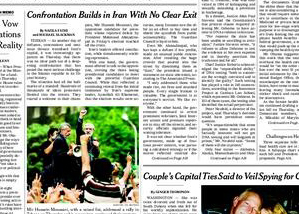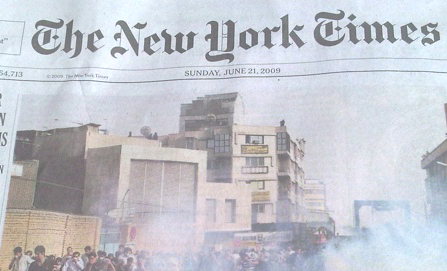Last night Journalism.co.uk picked up its laptop and notepad, and sat on the fence. Sitting in the audience of the Editorial Intelligence/Edelman/Reuters Institute for the Study of Journalism ‘Commentariat vs Bloggertariat, Who is winning?’ event typing away definitely had me branded as a ‘blogger’ by some of the established comment writers in the row in front, who seemed to throw a glance every time liveblogging was mentioned.
Blogger/reporter/observer – it was a night of arbitrary definitions – some of which were fortunately challenged by the panel of:
Martin Bright, New Deal of the Mind founder and Spectator blogger
Mick Fealty, political blogger at Slugger O’Toole and the Telegraph’s Brassneck blog
Iain Dale, Iain Dale’s diary
David Aaronovitch, comment writer for The Times
Anne Spackman, comment editor for The Times
‘versus’
Before attending the event I had some reservations about setting up bloggers/blogs vs comment writers/comment – so it was good to see this artificial opposition challenged by both panel and audience.
“They are part of the same thing – it is part of the same continuum. I think it’s an artificial distinction,” said Bright.
But there are new rules and etiquette that blogging, and the technology which powers it, have introduced, which are shaping the future of comment.
“Bloggers have been able to hold traditional commentariat to account. That gets an instant reaction from the commentariat because they’re not used to be held to accountable in this way,” explained Dale.
“When you do comment quickly you do make mistakes and you have to hold your hands up.”
And if the future of journalism and the business of publishing is online, bloggers are the pathfinders, added Fealty:
“We’ve changed the behaviour of a commentariat. It isn’t bloggers that have ripped the revenue out of the big newsgatherers – it’s Google,” he said.
“Online bloggers have started a party that is irresistible to the commentariat. Spreadability is the new currency. To do that you need a personal audience as a blogger.
“They [the commentariat] are better writers, but there are many more of us than there are of them (…) We’re getting stories from the little people, not the big people that the commentariat are. The people we talk to aren’t always the best behaved witnesses.
“We’re not obliged to fit in with someone else’s brand. Bloggers are brand builders, the new brand online (…) is us speaking directly from the gut.”
Anonymity and NightJack
Last night’s event was timely given the debate over the Times decision to out anonymous policeman blogger NightJack – despite a punchy start from Iain Dale, neither Spackman nor Aaronovitch would be drawn on the issue.
However, Spackman did say she agreed with Jeff Jarvis that social media sites were breaking down anonymity.
Aaronovitch went further saying he could see previously ‘anonymous’ political sources in comment writing being unmasked and suggested that this was a necessary development.
Bright agreed and said he hoped this would happen ‘organically’: “It is changing, but at the moment it isn’t changing fast enough.”
For journalists using social and new media sources, transparency is needed, added Aaronovitch: “There are synergies there (…) I use bloggers as sources of information I wouldn’t otherwise get. There’s a form of democratisation there. It’s unreliable democratisation – I don’t really know what I’m getting or who I’m getting it from.”
Twitter challenge and shaping the future
The commentariat has been with us for 25 years, but how the shape of the ‘bloggertariat’ will shift in the same time is almost unpredictable, he added.
“I absolutely love what the new media has created (…) the possibilities it has created for me and everyone else.
“We couldn’t even imagine two years ago that there’d be a form of 140 characters and we had no idea how it would apply itself to situations like Iran.
“‘Commentariat vs bloggertariat’ suggests a settled contention that we know where everybody is and everybody’s going.”
Indeed the rise of Twitter was agreed to be a somewhat unforeseen challenge to the dominance of blogging over traditional comment.
“I’ve yet to read a great classic blog post. I think it’s getting close with Twitter. Every now and then you do read a fantastic tweet,” said Bright.
But, commenting on yesterday’s launch of the UK Investigations Fund, Bright said he was concerned that developments and the future of neither the bloggertariat or commentariat would accommodate investigative journalism.
UPDATE – you can now download Editorial Intelligence’s podcast of the event.


